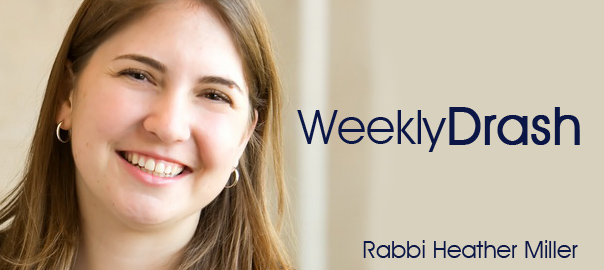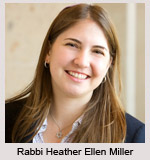DRASH: Parashat Acharei Mot/ Kedoshim [ April 19, 2013 ]

by Rabbi Heather Miller
Tonight, we here at BCC, are partaking in an event coordinated by Clergy and Laity United for Economic Justice– also known by it’s acronym “CLUE.” Several congregations around Los Angeles county have dedicated tonight’s Shabbat Services to
opening up a discussion about immigration.
We, Jews have a unique relationship with the idea of immigration, don’t we? Our very name declares it– the word in Hebrew for “Hebrew” is עברי –meaning, “one who crosses over” or “one who crosses boundaries.” We, Hebrews, ARE the quintessential border crossers.
Our most often repeated story of peoplehood is that of the Exodus out of Egypt. An immigration story!
But it is not only the stories of long ago journeys, fleeing Egypt or Spain or Portugal, that we know. Almost every one of us, within our own families, has been touched by a narrative of immigration within just a few generations of our own time.
 Before he died, my mother’s grandfather, my great-grandfather Julius Kirshenbaum z”l (1899-1981) wrote an essay about his long and remarkable life. I recently uncovered this account in an old box. In it, my great-grandfather recounted his narrow escape from the pogroms in Ukraine. He, and my great-grandmother, with their new baby knew that they had two choices: immigrate or die. Petlura and his gang were murdering Jews in the streets, storming businesses and homes and terrorizing everyone.
Before he died, my mother’s grandfather, my great-grandfather Julius Kirshenbaum z”l (1899-1981) wrote an essay about his long and remarkable life. I recently uncovered this account in an old box. In it, my great-grandfather recounted his narrow escape from the pogroms in Ukraine. He, and my great-grandmother, with their new baby knew that they had two choices: immigrate or die. Petlura and his gang were murdering Jews in the streets, storming businesses and homes and terrorizing everyone.
My great-grandfather details hiding in the basement while the home was searched, an icy horse and sled ride across Russia under the cover of darkness, a rush to obtain fake Polish passports for him and his young family. He was almost found out, and at just 19 years old, he cried under pressure when an immigration official grew suspicious of his falsified documents. Eventually and miraculously, he was able to immigrate all the way
from Russia to North America.
He wrote,
“When we came off the boat, we cried and we kissed the ground. And, we never stopped kissing the ground in our thankfulness for being in a free land.”
That’s the story of immigration of so many Jewish families. Thank God they were able to escape, albeit by surreptitious means.
My step-father’s mother, my step-grandmother Hana Posin z”l (1914-2001) also wrote a retrospective of her life before she died. Her immigration story was much more tragic. She wrote a difficult and brave autobiographical account for Steven Spielberg’s Shoah/Holocaust Foundation that recounted her experiences as a young Jewish woman in Czechoslovakia, the rise of Hitler, and the uncertainty of the future of the Jewish people.She painfully recalled how immigration from Czechoslovakia to the United States was closed to her and her small family in 1938. She wrote:
The U.S. consulate was besieged with petitioners. But they had a rigid
rule: so and so many people were allowed to immigrate from each country
per year. The quota for Czechoslovakia was filled up for many years
ahead. Where else to turn, if the most democratic country in the world
turned its back to people seeking freedom?
Unable to immigrate to America, my step-grandmother was sent to several concentration camps– Theresienstadt, Auschwitz, Mauthausen. She survived, though her young husband did not. Ultimately, after the war, she was able to immigrate to Columbia before finally becoming a legal citizen of the United States more than a decade later.
This tragic story of closed borders with eventual immigration is our Jewish story, too. And so are the stories of the Iranian Jews who immigrated here in the 70s and 80s. And so are the stories of Soviet Jews who immigrated in the 1990s. And so are the stories of others who sought to immigrate to a new land, and the dream that it held.
It is no surprise that a Jewish woman, Emma Lazarus, wrote the poem inscribed on the Statue of Liberty, who she describes as:
A mighty woman with a torch, whose flame
Is the imprisoned lightning, and her name
Mother of Exiles.
In the poem, Lady Liberty cries:
Give me your tired, your poor,
Your huddled masses yearning to breathe free.
There is no doubt that we Jews have a special relationship to the idea of immigration, and especially immigration to the United States.
We know what it promises, we have also felt the sting of denial.
The Torah portion this week is Acharei-Mot/Kedoshim. Within this double portion is a text known as the “Holiness Code.” It teaches many of the obvious tenets that lead a person to act decently in the world.
We learn that:
1 The Lord spoke to Moses, saying: 2 Speak to the whole Israelite community and say to them:
You shall be holy, for I, the Lord your God, am holy.
But what does it mean to BE HOLY?
Among other commandments, the holiness code itself teaches: 33 When a stranger resides with you in your land, you shall not wrong him. 34 The stranger who resides with you shall be to you as one of your citizens; you shall love him as yourself, for you were strangers in the land of Egypt: I the Lord am your God.
It says: .הַגֵּר הַגָּר אִתְּכֶם, וְאָהַבְתָּ לוֹ כָּמוֹךָ–כִּי-גֵרִים הֱיִיתֶם, בְּאֶרֶץ מִצְרָיִם: אֲנִי, יְהוָה אֱלֹהֵיכֶם The stranger who resides with you shall be to you as one of your citizens; you shall love him as yourself, for you were strangers in the land of Egypt: I the Lord am your God.
Do these verses instructing us to be holy still apply? How? And, are we doing what we should to treat the stranger who resides with us with decency?
Rav Eliyahu Dessler, spiritual leader from Latvia teaching in the 20th century, suggests that the obligation to act with respect toward another person derives not from that person’s nationality, but from his humanity. He writes: “The root of this obligation lies in our obligation toward a human being by virtue of his being a human being.”
Do we treat human beings, who have immigrated from one country to another, with dignity and with respect? Or with indifference, suspicion, or contempt?
Let us especially consider the experiences of LGBT couples who are bi-national. When immigration law is so tied to notions of family and marriage, and when gay and lesbian couples as a community don’t have the legal ability to marry, immigration law makes the families of our community especially vulnerable to immigration policy.
Who are the immigrants among us? How do we treat them and how should we treat them? What would it mean to truly be holy as this week’s Torah portion commands us to be?
Wrestling with these questions are the members of Clergy and Laity United for Economic Justice (CLUE) who work tirelessly to ensure dignity and respect for todays immigrants who, because of their tenuous legal status, are more vulnerable to abuse and exploitation. Our Reform Jewish Movement, too, has recently formed a group called Reform CA and they are working on Immigration Reform from a policy perspective.
Around us, there are opportunities to consider what it means to be holy and sacred in our interactions with immigrants– as Jews, as members of the Reform movement and as Californians. May we each work to identify ways that we can uplift and dignify their experiences as precious threads in the fabric of our community. Amen.




